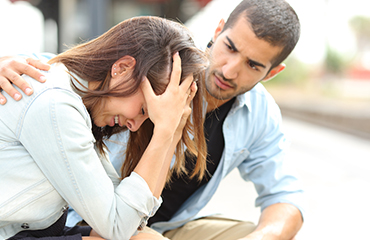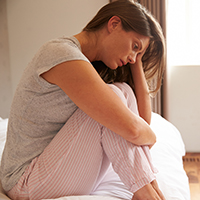 Help is available for substance-related issue you may have developed due to abuse.
Help is available for substance-related issue you may have developed due to abuse.
Getting out of the abusive situation is the first step toward healing and moving on in your life, but unfortunately, your work doesn't end there. Once you are physically safe and secure, it is a good idea that you seek professional help for any abuse-related difficulties you may develop.
- For example, you may have difficulty coping with abuse memories themselves.
- You may also benefit from assistance in coping with problems that develop because you were abused, such as:
- Substance abuse problems.
- Sexual or intimacy issues.
- Anger issues.
- Eating disorders.
Such problems may occur during your abuse period (as a means of coping with the abuse itself), or after the abuse period is over (as a means of coping with the abuse memories). Using
alcohol and illicit substances is a common way of coping with the pain of abuse. If you have become dependent on a substance due to the trauma of abuse, don't worry, help is available. Please read more
here.
Responses to Being Abused
It is important to keep in mind that each individual will have a different response to abuse. Each person experiences abuse differently, and is able to cope with abuse in different ways depending on their circumstances.
- While one person may suffer greater consequences as a result of abuse than another, there should be no shame involved in how little or much impact is suffered.
- There is a lot of luck involved when people who have been abused are able to resiliently recover from abuse with few scars.
- It doesn't happen often, and much of the circumstances that make it possible to accomplish are not directly in the control of those fortunate few.
- People have little control over whether they are abused, and little control over how that abuse impacts them.
What people do have control over is their choice to seek help, and to make the commitments necessary to help themselves recover. It is by this last yardstick (how much people choose to actively work at helping themselves recover rather than passively accepting that they are 'ruined') only that it may appropriate to judge abused people.
Don't Blame Yourself
It is important to not blame yourself for having been abused, no matter what the circumstances of your abuse may have been. People tend to blame themselves for 'allowing' abuse to have happened to themselves.
They may say things to themselves like, "He hit me because I was stupid and I deserved it", or, "I was a bad child and deserved what I got", or , "I'm ugly (or a slut), that's why he ignored me (or molested me)".
Just because you say things like this to yourself doesn't make them true.
- Abuse is abuse - it occurs when someone mistreats another person, ignoring their own wishes and dignity.
- You did not ask to be abused, and you probably had few ways to avoid it happening throughout most of the period the abuse occurred (if not all of it).
- Blaming the victim is common, but it doesn't make it a right or accurate thing to do. You are not to blame for having been abused.
Nobody deserves to be physically, sexually, or emotionally abused - whether as an adult or as a child. Abusive people are unable or unwilling to control their worst appetites. They are psychologically ill and or medically ill. Abusers cause the problem of abuse - they perpetrate abuse on those people around them. Abused people are not responsible for causing abuse, unless and until they become abusers themselves.


